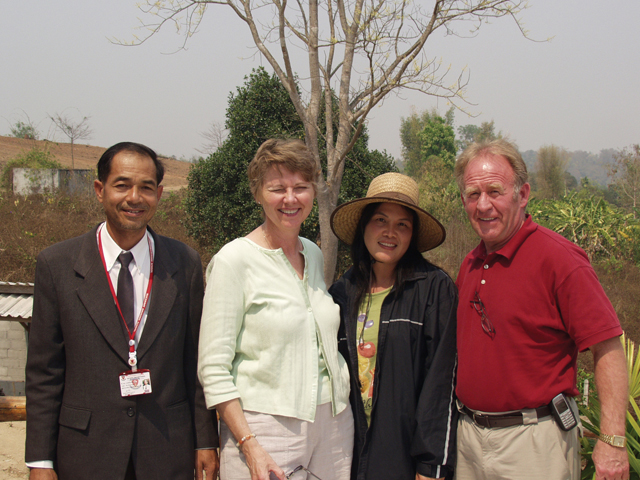Up for the challenge
Mission in Thailand means plunging into unknown waters and encountering the wonderful world of Thai language and culture
By Anne Harty
June 2007
Return to Table of Contents
Print Article
Almost every person that I’ve spoken to about learning Thai has said that it is a very difficult language to master.
 (Credit John Carten, SFM)
(Credit John Carten, SFM)Anne and Glenn Harty visit with a fellow teacher and his wife at their mushroom farm. They teach at Nuchanat Anusorn high school in the village of Wiang Pa Pao near Chiang Rai, Thailand. There are 1,650 students, 125 of whom board at the school. Anne assists in the English department and Glenn helps the older youth in residence with their studies.
No problem I thought, as I perused the “Thai for Beginners” handbook; it looks to me like just a lot of memorization. I was up for the challenge and the chance to prove the naysayers wrong, those who told me that it would be even more difficult “now that you’re older.”
So with my trusted handbook in hand, I plunged in. However, I quickly realized that I was dead in the water because Thai is a tonal language. For example, “Maai mai mai mai mai?” translates as “New wood does not burn, does it?” Each of the mai words used in the sentence has a different tone and tone mark. If you use the wrong tone, you will not be easily understood. To pronounce one of the five tones, the rising tone, of “Maai mai mai mai mai?,” your voice starts at a low pitch and goes up, much like a question in English.
Another challenge is sentence structure: “Where is the red car?” would be “car red where?” As well, the Thai language has no spaces between words, no punctuation and no capital letters.
Despite the challenges, our Thai language teacher, Areeluck, has made learning fun. Some days when the class is just not getting it she’ll pretend to hit her head against the wall. We all break out in laughter. Besides teaching us the language, she also shares her Thai culture with us and is a wealth of information.
Glenn and I have studied Thai for three months now and I think we’re getting the hang of it. Whatever Glenn forgets I remember and vice versa. As long as we’re together we are able to make complete sentences.
One of our class assignments was to go to a local restaurant and order our meal in Thai. Glenn memorized the Thai words needed. However, instead of saying “pad Thai,” which is stir fried noodles, he asked for “Thai pad,” which is stir fried Thais—the people, that is. Well, the young waiter had to hold his stomach he was laughing so hard. We decided not to order dessert.
The other day we asked the roadside vendor, “kai hok krap” (egg six please). When emptying the bag at home we discovered ten eggs. Needless to say we will continue our classes for another month. We’re grateful for the opportunity to learn a little of this wonderful language and culture. The rewards far outweigh the struggles, especially when we receive a big grin from a Thai person after our attempt to communicate. Thankfully, the Thais are a patient people.
Return to Table of Contents
Print Article